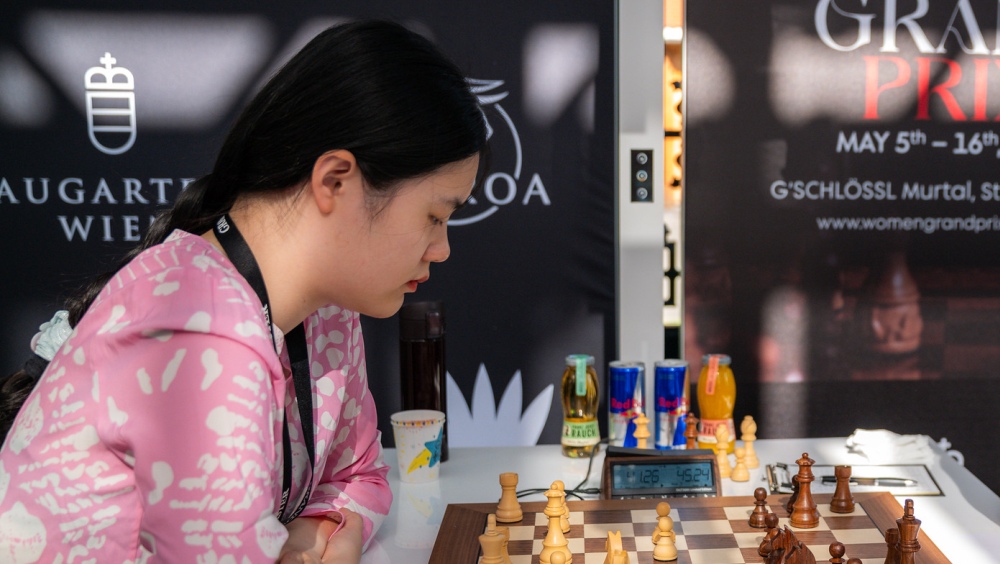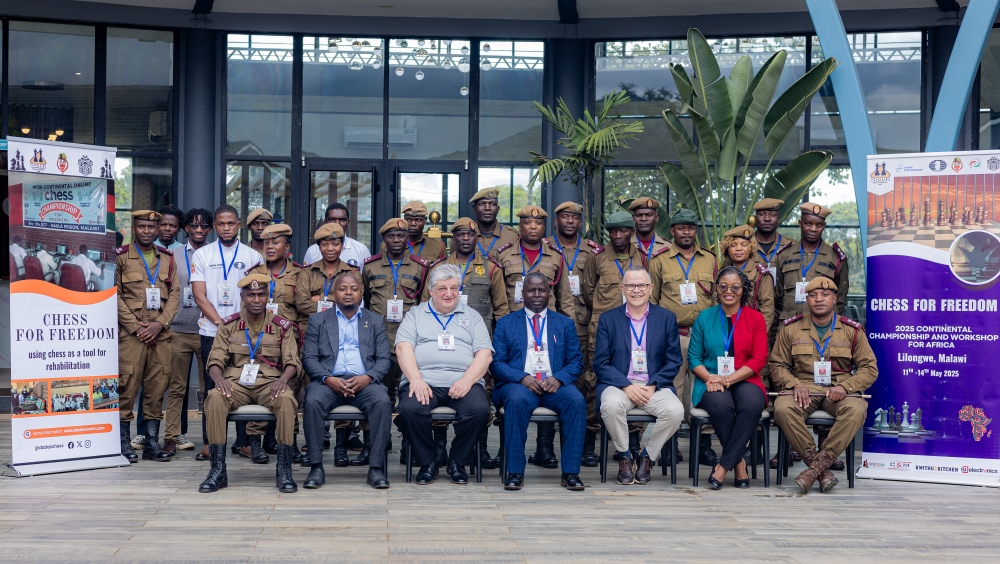WGP Austria R07: Zhu catches up with Anna Muzychuk in the race for the crown

In a day of fast and sharp games, Zhu Jiner scored her fifth consecutive victory to tie for first place with Anna Muzychuk, who made a third draw in a row. Tan defeated Javakhishvili and is now half a point behind the leaders. Mariya Muzychuk pulled off her first victory in the tournament in a blunder-laden game against Olga Badelka. Round seven of the final 2024/2025 Women’s Grand Prix leg delivered four decisive outcomes in under four hours, leaving just one draw. A blunder by Nana Dzagnidze helped Zhu Jiner secure a fifth consecutive victory, joining Anna Muzychuk at the top, on five points. Another Chinese player, former World Champion Tan Zhongyi, is just half a point behind, in striking distance. Vaishali is in fourth place, on four points. After a great start in the first part of the tournament (with two wins and two draws), she stumbled, making just one point out of the last three games. Zhu and Anna Muzychuk are the only two players in this tournament who have a chance to win the overall Grand Prix series, and there are just two more rounds to go! A look at the games of round seven Zhu Jiner benefited from an oversight by Nana Dzagnidze, who blundered in an inferior position. Nana made a serious inaccuracy on her previous move and here she had to give up her a-pawn – 35…Nb6 36.Qxa5 Nbd7 blocking White’s passer. Instead she played 35…Rf4? missing a refutation 36.d7! A perfect illustration of deflection! 36…Nxd7 37.Qxd5 and White is a knight up. In another Nimzo-Indian, Vaishali ended in time trouble as Black against the great Alexandra Kosteniuk. The former Women’s World Champion surprised her opponent with 1.d4 – which she usually doesn’t play against Vaishali. “There are many first moves,” Kosteniuk said – “but the most important thing is not what you play but how you play.” In this position, Black was in time trouble and under pressure. 23…c5?? Playing 23…b6 or …b5 with an exchange on the d-file was a much better option. 24.bxc5 Nc6 25.Rxe4!! Bxe4 Black cannot take with the knight because of mate on g7. 26.Nxe4 Ne5 27.Nd6! And now Black has to give up a rook on d6. She cannot play 27…Re7 because of 28.Bf5 and the queen is trapped. And if 27…Rf8 then Black loses the knight on e5. A few moves later, Vaishali resigned. This was a second consecutive victory for Kosteniuk, and she now has 3.5 points. Though pleased with this victory, Kosteniuk expressed dissatisfaction with her overall performance. As she pointed out, “the quality of my games in this tournament is about 73-75 percent. And if my performance is below 90%, I think it’s very bad.” The most dramatic or, rather, most chaotic game of the round was played between Olga Badelka and Mariya Muzychuk, where both traded grave errors in time trouble. In the Slav Defence, former Women’s World Champion Mariya Muzychuk took a pawn in the centre that gave White an upper hand in development and a strong attack. However, Badelka did not find the best continuation and after a series of mutual inaccuracies by move 31, the position was sharp for both. 31…Qb7, threatening mate on b2. Instead of 32.Qb3 Badelka played the seemingly natural but losing move 32.b3. However, it fails to 32…R5f3! and now White is completely lost. In time trouble, both traded mistakes, with the position swinging from a total victory for Black to a draw: 33.Qg6 Qf7 34.Qxe6 Rxa2 Black is better, but White has chances. 35.Qc8?? Blunder. Black is winning. 35…Qf8?? Now it’s equal. 36.Qe6+ Kh8 37.Qe5?? Black is now winning: 37…Rff2. Soon the two reached the first time control and it was completely lost for White. The first victory for Muzychuk in the tournament, who is now on 3/7. Badelka’s third consecutive loss leaves her on two points. In the main line of the Giuoco Piano, China’s Tan Zhongyi and Lela Javakhishvili from Georgia followed well-known theory. But on move 17, Black made her first serious inaccuracy. White seized the initiative and emerged notably better. Soon, Black overlooked a pawn, and it was all over for her. Tan confidently converted her material advantage into a full point. The only peaceful game of the day was between Anna Muzychuk and Nurgyul Salimova. In the Four Knights Game, the position was even throughout without much excitement. The two agreed to split a point after move 40. Anna Muzychuk has five points and is the only undefeated player in the tournament so far. Standings after Round 7: A rest day is not a no-chess day On Monday, 12th May, during the rest day at the Women’s Grand Prix in G’Schlössl Murtal, a VIP event featured a blitz tournament and a challenge match against 15th World Champion Viswanathan Anand. Alexandra Kosteniuk, Mariya Muzychuk, Tan Zhongyi, and Austria’s Olga Badelka faced six young Austrian talents, with all games won by the experienced Grand Prix players. The youngsters then faced Anand one-on-one in a blitz challenge to see who could hold out longest. Katharina Pötscher lasted 55 moves for the day’s longest game, but it was Eva Maria Schmied who surprised everyone with a draw—winning two pawns and trapping Anand in perpetual check. A gala dinner at the G’Schlössl Orangery closed the day, with players, FIDE officials, and guests gathering for the evening. Felix Blohberger’s historical chess puzzles set up on each table provided entertainment, as FIDE CEO Emil Sutovsky correctly identified all of the positions and their backstories. Anand on India’s chess boom: Strong foundations and rising stars During a live broadcast with Felix Blohberger, Indian chess legend Viswanathan Anand reflected on the remarkable rise of Indian chess, crediting the country’s structured support system and cultural acceptance of the game. Anand highlighted the role of key regions – such as his home state Tamil Nadu, but also Pune, Kolkata and Mumbai in building chess expertise. “We have excellent coaches… and I think the cultural acceptance is quite high, so
Malawi hosts the Chess for Freedom Continental Championship and Workshop for Africa

The FIDE “Chess for Freedom” program is the largest global initiative of the FIDE Social Commission. In the Year of Social Chess, each month highlights a specific social group, and May focuses on the “Chess for Freedom” initiative with two major continental conferences and tournaments—first in Malawi (Africa), followed immediately by another one in Mexico (Americas). The primary goal of these conferences is to expand the reach of the Chess for Freedom program from its current presence in 50 countries to over 60. This was the motivation behind organizing the African Conference in Lilongwe, Malawi, under the leadership of Susan Namangale, Dadaz Academy Chess Founder and Member of FIDE PDC Commission. The first day featured a workshop involving representatives from the FIDE Social Commission, officials from Malawi’s Prison Service, prison directors from across the country, and delegates from Ghana, Kenya, and the Malawi Chess Federation. Also in attendance were members of Dadaz, a local chess academy led by Susan Namangale, who also serves as a representative of Malawi’s Sports Council. The day included presentations, interactive discussions, fostering a collaborative and visionary atmosphere. The hybrid format allowed for international participation via Zoom. André Vögtlin, Chair of the FIDE Social Commission, praised the initiative as a well-established global project and expressed satisfaction with its successful introduction to Central and Southern Africa. He expressed hope that many new countries would now join the movement and participate in the 2025 Chess for Freedom World Championship in October. Vögtlin personally thanked Susan Namangale for her outstanding efforts and presented her with a certificate of recognition from the FIDE Social Commission. Susan Namangale emphasized that chess has a transformative effect on incarcerated individuals and sees her collaboration with Malawi’s prison system as a foundational element for expanding the Chess for Freedom program in the region. She expressed great satisfaction in witnessing the growth of social chess in Malawi. Project founder Mikhail Korenman expressed his delight with both the workshop and the subsequent championship, praising the exceptional organization. He highlighted the logistical achievement of safely transporting inmates from different prisons to the central venue—an approach that is rare globally. Both Korenman and Vögtlin noted that Malawi could serve as a role model for other African countries in the development of the Chess for Freedom initiative. The conference also showcased the success of partnerships, notably with Gift of Chess, in supplying chess sets. Maxwell Kamova, Assistant Commissioner of the Malawi Prison Service, stated that the chess program has had a profoundly positive impact on inmates, contributing to behavioral improvements. He mentioned that Malawi has specific guidelines for pardons and sentence reductions, and chess could potentially be used as a criterion for early release, given its role in promoting good behavior. The second day saw the African Continental Chess for Freedom Championship held at Maula Prison. Four teams from Malawi participated: two men’s teams, one women’s team, and a youth team. Additional teams from Zimbabwe, Ghana, and Kenya joined the tournament. Team Zimbabwe emerged victorious in the open section, followed closely by Malawi I and Malawi II. Malawi’s youth team was at a slight disadvantage due to a last-minute illness, yet home youngsters had a good showing, placing second, third, and ninth. André Vögtlin noted that the online Chess for Freedom format has proven effective for inter-prison competition, and that this championship served as an excellent trial run ahead of the global championship in October. Special thanks go to the technical team led by Nebojsa Baralic, who coordinated the online components of the tournament via Zoom and ensured smooth operations on chess.com. In closing, Mikhail Korenman stated: “Malawi is not only a strong partner for this project but for chess development in general.”
Changes to the World Rapid & Blitz format and a 1M euro prize fund

The International Chess Federation (FIDE) has announced a series of format enhancements and a one million euro prize fund for the 2025 World Rapid and Blitz Championships. Set to take place in Doha, Qatar, the World Rapid and Blitz Championships have become one of the most prestigious events on the international chess calendar since their official launch in 2012. Traditionally held in the last week of the year (from 26 to 31 December), the event attracts the best players in the world, including current world champions Gukesh Dommaraju and Ju Wenjun, as well as the world’s top-rated player, Magnus Carlsen, and a host of other heavyweights in both the Open and the Women’s competition. “We are very much looking forward to hosting the chess world in Doha and are happy to see FIDE has introduced important enhancements to the regulations,” said Mohd Al-Mudahka, President of the Qatar Chess Association. “We are committed to supporting chess, as we have shown with the Qatar Masters which has become one of the most prestigious chess tournaments globally. Doha also successfully hosted the World Rapid & Blitz Championships in 2016, and we are proud to welcome this flagship event back to our capital, further strengthening our place on the global chess map.” For the 2025 edition, the prize fund has been set at one million euros (approx. 1.125 million USD), maintaining the high financial standard of recent editions and reaffirming FIDE’s commitment to top level competition. The total will be split between the Open and Women’s events, with €700,000 allocated to the Open section — evenly divided between the Rapid and Blitz tournaments — and €300,000 for the Women’s section, also split equally. A new knockout format for the Blitz The two-day Blitz World Championship is the most watched and the most dramatic chess event of the year. In 2024, FIDE introduced a new knockout format in the Blitz that brought even more excitement to the event. In a significant structural shift, for 2025 FIDE is introducing a more streamlined knockout stage in the Blitz events in the Open and the Women’s sections. Only the top four players from the Swiss stage of the tournament will advance directly to the knockout semifinals (previously, eight players in both competitions qualified for the knockout). “The new format is an exciting mix of the Swiss system and knockout. The increased number of rounds in the qualifying part ensures that the strongest players will progress to the knockout. Also, the final match-up is ideally scheduled to suit audiences across all major chess hubs,” FIDE CEO and Grandmaster Emil Sutovsky said. “We are very excited about the event, and have already started preparations to produce the best quality broadcast for millions of spectators,” Sutovsky added. The Blitz schedule includes 19 Swiss rounds for the Open and 15 Swiss rounds for the Women, both played over two days, followed by semifinals and finals on December 30. The format for the Rapid World Championships remains unchanged, with 13 rounds in the Open and 11 in the Women’s competition, culminating in a playoff in case of a tie for first place. “With rapid and blitz formats gaining global popularity, the field is deeper and more competitive than ever,” said FIDE President Arkady Dvorkovich. “These format enhancements aim to make the event more dynamic while preserving the sport’s integrity and excitement for both players and fans.” Regulations for the 2025 World Rapid and Blitz events: Open – handbook.fide.com/files/handbook/wrbc_regulations_2025_open.pdf Women – handbook.fide.com/files/handbook/wrbc_regulations_2025_women.pdf

